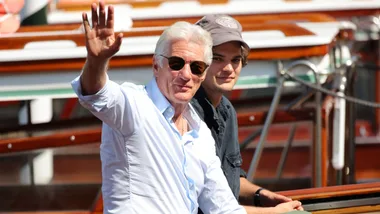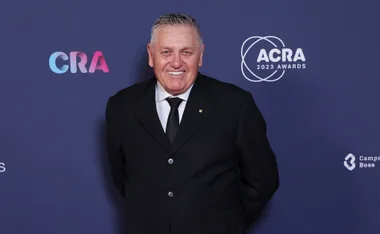Whether you want curry in a hurry or a delicious slow-cooked meal, we’ve got 10 of the best curry recipes right here.
Former Aussie cricketer Shane Warne has accused Brynne Edelsten of tipping off the paparazzi as photographers were “conveniently waiting outside” her home when he arrived for a “nightcap” at 1am last night.
The father-of-three, who is known as a notorious ladies man, took to Facebook and Instagram to shame the American personality for allegedly setting up the encounter.
“Some people never cease to amaze me. Listen to this one,” the I’m a Celebrity… Get Me Out Of Here! star began to over 700,000 followers.
“After a fun night raising money for breast cancer in Geelong last night, me and a few friends plus Brynne Edelsten went out for a couple of drinks.”
“Brynne then invited me back to her place around 1am for a nightcap, when I arrived, paparazzi were conveniently waiting outside her home to get the pic, coincidence? I left instantly and thought how sad is that!”

Brynne is yet to comment on the accusations, but funnily enough, the father-of-three’s late night incident wasn’t the only one of the night.
The Herald Sun also revealed that a stretch Chrysler limousine booked for I’m a Celeb winner Alex Fevola and his wife Alex had been reported stolen.
Police discovered the vehicle bogged in the mud in a town called Lara situated 18km north-east of Geelong, where the charity poker tournament was held.
This story originally appeared on Woman’s Day.
What’s better than a meat pie? A sweet pie! Here are eight of our best dessert pies.
Mention Woody Allen’s name around Susan Sarandon and prepare to see her get angry!
“I think he sexually assaulted a child and I don’t think that’s right,” the Thelma and Louise star said during Variety and Kering’s Women’s in Motion talk.
“I have nothing good to say about him. I don’t want to go there.”
It comes after Ronan Farrow, Allen’s son with Mia Farrow, wrote a column in The Hollywood Reporter about his sister Dylan’s allegations that Allen sexually abused her as a child.

Blake Lively and Woody Allen at the Cannes Film Festival earlier this week.
Ronan wrote that the media are not asking Allen enough questions and went on to call out stars for continuing to work with him.
Woody has long denied the allegations recently writing in The New York Times, “of course, I did not molest Dylan.”
Naming a child is a big responsibility and many people have months of short lists before they even get close. Others seem to find inspiration from the world around them, and the rest?
It would take a certain type of humour to knowingly name a child a ridiculous name that will plague them forever, so we must give people the benefit of the doubt that they feel they’re giving their child a solid moniker.
Benefit of the doubt or not, a reddit reader posed the question “what is the most ridiculous name you’ve heard a person call their kid?” and the thread is equal parts perplexing and amusing reports Daily Mail.
“My daughters had friends in middle school whose parents were astronomers. They named their three girls Galaxy, Neptune, and Uranus. I really felt sorry for Uranus. This is 100 per cent true,” said one person in the thread.
“A friend of my father had the misfortune of being named Adolbenhiro. His parents named him after Adolf Hitler, Benito Mussolini and Emperor Hirohito,” said another.
Celebrity inspiration is not a new thing, but you at least need to ensure you’re pronouncing right as one unfortunate kid will discover.
“There was a French couple naming their son Clitis,” tells one reader.
They claimed to love the actor so much that he was their motivation. When asked to clarify exactly which actor they meant, the answer was hilarious.
“They replied with their funny French accent “You know…Clitis Wood”…meaning Clint Eastwood. It’s true I swear!”
Movie characters also feature highly, however some people’s choice comes into question. Why would you name your child after a “baddie”?
Anakin appeared on the numerous times which implies more than one person is not only a Star Wars fan, but also a Darth Vader fan.
“My mother told me that she once met a set of boy/girl twins named Luke and Anakin. I was doubly mad at this as Anakin is a Boy’s name and those parents missed a golden opportunity to name them Luke and Leia,” said reader, Darth_Pyre, who is possibly a large fan themselves.
Celebrity choices also came under fire with all four of Jamie Oliver’s food and flora inspired children’s names getting an honourable mention; Poppy Honey, Daisy Boo, Petal Blossom Rainbow and Buddy Bear.
North West also made a guest appearance with guesses on her middle name… is she North 30 degrees West or North North West?
Names with rude connotations featured strongly, with Anal, Colon and Labea making the hit list.
“About a year and a half ago, I was helped by a cashier whose name-tag read “Labea,” said Ramses the Pigeon, who later discovered it was pronounce Luh-BEE-ah, however that barely seemed better.
“One of the students in my dorm was named “Colon,” added foobphys.
“The girl at the lab was called “Anal.” It means fire in Hindo or something,” said another reader.
Creative, kooky or downright odd spelling has always raised eyebrows in the baby naming game with Quistina (Christina, but like Elmer Fudd), Air-wrecka (Erica but ghetto), Destany, and Honasty (spell check anyone?) setting the thread alight.
The top of the list, seems innocuous enough with his friend’s calling him Ody, however his parents call him something much grander.
“My cousin’s best friend is named Ody which I thought was random until I found out his full name was Odysseus. At first I thought it was ridiculous but I am sort of jealous.”
May all the children named after mythology and gods live up to their names, and may anyone named after food forgive their parents.
A mother who was shocked after her daughter’s Catholic school rejected her request to wear trousers started a petition to overturn the ruling – and she won!
Mum Simone Cariss told Kidspot: “The Principal called me today and said she hadn’t responded very well in the first place and that they would form a committee to discuss the changes and then roll them out.”
“I haven’t told Asha yet because she’s at school but she’s going to be rapt,” she continued.
Earlier, she was shocked to learn that her six-year-old daughter Asha wasn’t allowed to wear trousers and shorts in winter. All she wanted was to be warm and play sport with her male school friends.
The Melbourne school was adamant Asha had to stick to the girl dress code which is a dress in summer and a tunic and tights in winter.
Furious at the decision, Mrs Cariss launched a petition for the local government to make a change, urging people against the ‘antiquated and sexist’ policy.
It was an obviously winning formula for her as the school changed their decision!
In the petition – which currently has over 3,000 signatures – Mrs Cariss said: “My daughter simply wants the right to wear pants or shorts at school – not just on sports days but everyday.”
“It’s 2016 after all and she is still forced to wear a dress (which is very different from choosing to wear a dress).”
“It’s antiquated, sexist and in my view discriminatory.”
She continued: “My daughter, like many other girls, simply wants the choice to wear pants like half of her peers, with the warmth and freedom to be active at school and travelling to/from school.”
“She constantly asks “why can’t I wear pants like the boys?” “Because you’re a girl” is not something I am prepared to say to my 6 year old daughter.”
A spokeswoman for the Department of Education and Training told The Age said schools have the power to implement their own dress codes.
But a report on uniforms by the Victorian Government says: “The Victorian Department of Education and Early Childhood Development recognises gender differences in dress codes and school uniform policies as an area of risk with respect to discrimination.”
“In general, where options are to be available, they should be available to both boys and girls.”
To keep the topic ‘broad’, Mrs Cariss has not named the school.
Trending video: The Queen celebrates her 90th birthday
It’s a photo of a dad comforting his sick child however; Facebook doesn’t seem to see it that way.
The image was originally shared by mum Heather Whitten of her husband Thomas and son, Fox.
However, the image has been removed countless time from Facebook for “violating” its rules when it comes to photographs, The Sun reports.
Heather and Thomas, who are parents to twins Fox and Persephone, Lillian and Leena, shared the image on Facebook after Fox had an attack of vomiting and diarrhoea.

Heather with her twins.
The tot was taken to hospital with salmonella poisoning but before that, Thomas held him in his arms in the shower and Heather captured the touching moment.
“Thomas had spent hours in the shower with him, trying to keep his fever down and letting the vomit and diarrhoea rinse off of them both as it came,” Heather wrote.
“It was a powerful moment for us as parents.”
“As I sat in the shower with the two of them I was just overwhelmed with the scene in front of me. This man. This husband and partner and father.”
“He was so patient and so loving and so strong with our tiny son in his lap. His whispers of reassurance to Fox, that he would be OK and that Thomas would take care of him were so steady and so honest.”
Despite Facebook repeatedly pulling the image, it’s been shared over 31, 000 times.
It’s not the first time people have gotten angry about an image being removed.
Earlier this year, a cancer patient shared a picture of her nipple to raise awareness of unusual breast cancer symptoms.
It too was removed.
The talented singer missed out on first place by a fraction.
Ukraine’s Jamala proved the overall winner of the competition raking up 534 points thanks to her son 1944, while Australia was on 511, and Russia’s Sergey Lazarev came in at third place on 491 points.
Catching up with the star following her huge success was our very own Claire Isaac, Woman’s Day’s Executive Editor. Dami revealed that despite her success she “misses home and Australia will always be home!”
Watch Dami’s exciting chat in the player above!
“I have to thank Europe for inviting us to be part of such a fun event,” the 27-year-old gushed following her performance.
The 2013 X Factor winner delivered yet another powerful performance of her hit song, The Sound Of Silence, which saw her win the jury vote.
But ultimately, Ukraine took out the popular vote and sailed through to first place.
Dami looked stunning in a sparkling gown by Australian designer, Steven Khalil.
Moments before taking to the stage, the Australian-Korean singer took to Instagram to thank her fans.
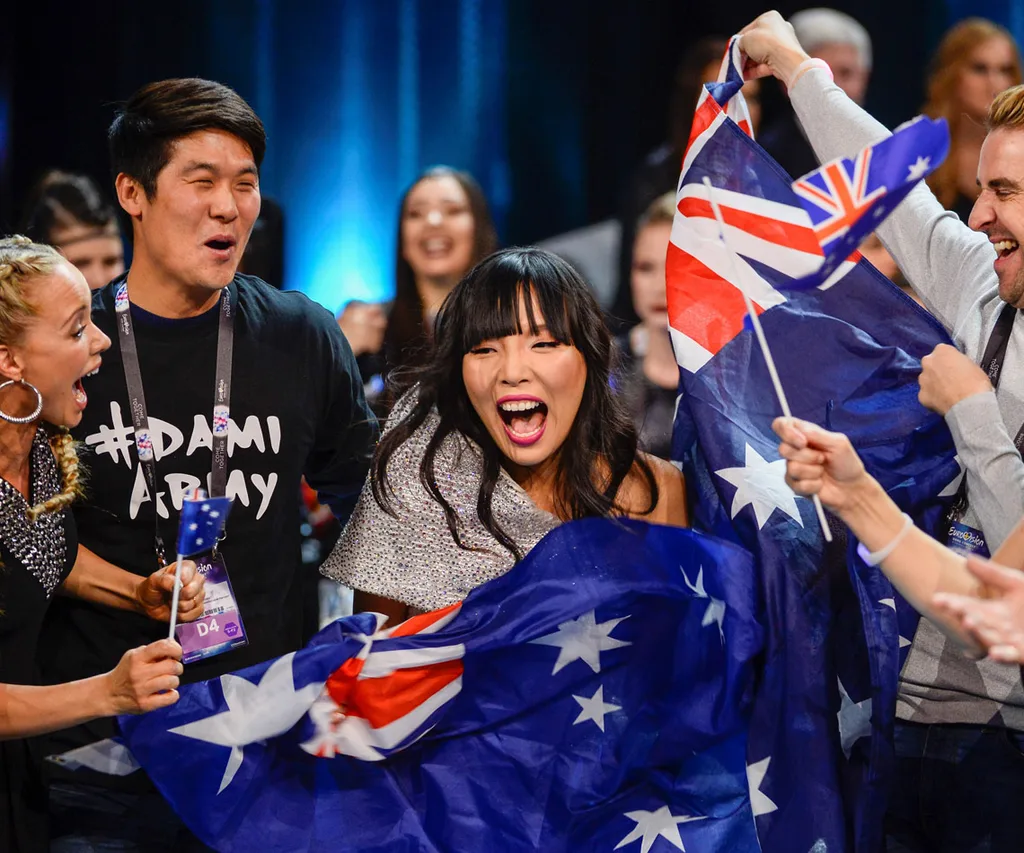
Dami has fast become a fan favourite in Eurovision!
“The Grand Final is only hours away!!! I couldn’t have been here living my DREAMS without the many people behind the scenes working their bums off and I can’t find enough words to thank them,” she penned.
Adding: “No matter what happens tonight I’ll do it for the people around me, for the music lovers, and for Australia. Love you all and be watching!!”
Dami’s success marks a huge moment in the competition, paving the way for the future batch of Australian stars wanting to perform at Eurovision.
In 2014, Jessica Mauboy was a guest performer during the competition but not an actual contestant.
Last year Guy Sebastian, who finished in 5th place his tune Tonight Again, was guaranteed a spot in the grand final as a courtesy for Australia’s first year competing, but Dami won her spot in the final round after her show-stopping performance during the semi-finals.
Congratulations to Dami! What an amazing victory.
Think of Eurovision and you’ll likely conjure up images of flamboyant, sequin-coated extroverts sashaying across the stage to catchy beats in a gloriously kitsch and camp celebration of pop music.
Which is why, at first glance, Australia’s 2016 representative, Dami Im, might not seem an obvious choice.
The 27-year-old singer is a self-confessed introvert who’d rather a quiet coffee than a glitzy cocktail.
A devout Christian, you won’t see her performing explicit moves in a raunchy outfit on stage, or stumbling out of a nightclub in the early hours. Indeed, Dami started out as a gospel singer before becoming an award-winning classical pianist in her teens.
Yet dig a bit deeper and you’ll realise that Dami is, in fact, the perfect Eurovision choice.
After moving to Australia from South Korea as a child, she worked hard to succeed at school and in music. Despite a prodigious natural talent as a pianist, Dami spent hours in her bedroom as a teenager recording herself singing pop songs in a bid to improve through sheer determination.
Three years ago, the then unassuming piano teacher overcame her nerves to win the Seven Network’s The X Factor. Her resulting fan base is fiercely loyal: they relate to her humble, uncontrived and down-to-earth nature, and her compelling story of rising from suburbia to stardom.
And most of all they love her music.
With her Queensland accent, a self-deprecating sense of humour and a love of cooking Korean food and cake-pops, Dami embodies the diversity of 21st-Century Australia.
Furthermore, her Eurovision song – Sound Of Silence – is anthemic yet profound; a modern lament on the personal disconnect between loved ones in our digitally connected world.
Eighteen years ago, Dami’s mother, Hae Yun Lee, an opera singer, and father Dong Eal Im, who ran a family business manufacturing computer parts, moved to Australia in a bid to give their daughter and her younger brother, Kenny, a better life.
Her dad would continue to work in South Korea to support the family, only reuniting with his family in Brisbane for a week at a time during school holidays. Meanwhile, her mum had to learn English, run a household and raise the children.
“Korea is polluted and grey,” says Dami, “and very competitive. Here, my parents found kids could be kids – they could play in the grass and didn’t have to study all the time. My parents were young and it was a big sacrifice to be separated, but they did it for us.”
Nevertheless, arriving at school as a shy nine-year-old with hardly any English was daunting.
“I remember coming to class and just not understanding anything,” Dami recalls. “But one day, I played the piano and everyone thought, ‘Wow, she’s good at something’. Because, up until then, they thought I was dumb. I got respect from it and then I became good [at piano] and started winning competitions.”
Watching cartoons and listening to music helped her to learn English. “I remember reading the sleeve of a Spice Girls CD and seeing the word ‘gonna’,” she says, laughing, “So I used that word in my next essay – [the teacher] had to explain that wasn’t right.”
Cemented in her role as “piano girl”, Dami never sang at school, instead playing accompaniment to the choir. Despite her extraordinary gift for piano, however, her real passion lay buried and unpolished.
“When I got into high school, I realised I didn’t want to play piano,” she says, “I wasn’t enjoying it anymore. I was confused.”
So, behind her bedroom door in Logan, south of Brisbane, Dami began focusing on her voice. “I’d listen to singers, copy them and record myself singing to backing tracks on my crappy laptop,” she says.
“I tried to hide it because I didn’t want my parents to know. Mum knew what I was doing, but she knew I’d be embarrassed about it, so we didn’t talk about it.”
After gaining high marks at school, Dami’s parents convinced her to study music at university before pursuing her singing.
“When I first said I wanted to be a singer, they were worried,” she says. “Now they’re excited [about Eurovision] – but mostly because they like showing off to their friends!”
In 2012 Dami married her childhood sweetheart Noah Kim, now a social worker, whom she’d met through church. She’d had a crush on him as a 13-year-old, but he’d always treated her like
a younger sister, she says, until he returned from compulsory national service in Korea, seven years later.
“He’s a confident person,” Dami says. “I don’t think there are many men who would feel so comfortable when their wife is doing well. During The X Factor he was very much ‘Dami’s husband’ and he left work for two years to support me.”
It was Noah who convinced Dami to audition for the show three years ago. “I’m not an extrovert – people assumed I was a contestant’s parent or friend or something,” she says, smiling. “I was terrified I’d be booed off the stage and it would be embarrassing.”
When it was her turn to stand as the last contestant before the jaded celebrity judges, shortly before midnight, she appeared endearingly awkward – until the moment she broke into Hero by Mariah Carey and blew everyone away.
Yet she didn’t let herself get carried away by the rapture. “[During the show], every night, people were off partying,” remembers Dami, “but I would be in my room, practising.” Her trademark conscientiousness paid off and she won the show.
Despite being part of the only family of Asian heritage in her primary school, Dami says racism wasn’t an issue growing up.
“Kids do pick up on any difference,” she says, “And people teased me because I couldn’t speak English very well. But generally the kids were more fascinated by me – they wanted to touch my hair.”
More recently, however, Dami has been the target of hurtful racist taunts.
“There are weirdos on social media and people saying things like, ‘Why don’t they send an Australian to Eurovision?’,” she says.
“I am Australian. And it feels great that I get to represent Australia, which is well known as a culturally diverse place where everyone is accepted the way they are.”
Her fans – also known as Dami’s Army – campaigned hard to help send her to Eurovision. “It’s a wide demographic, from young teens up to 70-year-olds,” she says. “I’m not the one they’ll see in sexy, raunchy outfits, so older people feel comfortable watching me.”
Dami says it’s faith, family and charity work that keep her grounded in a notoriously fickle industry.
“With all the ups and downs in this industry, I think it really helps knowing your values and having a firm belief about life and what’s important – and what’s not,” she says. “Your chart position can play with your head but I remind myself I am making songs to help people connect and use the talent God’s given me.”
Dami’s new album Classic Carpenters will be released on April 22.
Notorious ladies’ man Shane Warne has been left red-faced after being caught out again – and this time with reality star Brynne Edelsten!
Despite doing his best to deny the pair’s late-night hook-up, the former king of spin was caught on camera in front of the socialite’s apartment block in the early hours of Thursday morning, when he claimed he was heading for a “nightcap.”
Furious at being found out, the I’m A Celebrity… star, 46, went into damage control, taking to Twitter to accuse the ex-wife of millionaire Geoffrey Edelsten of tipping off the paparazzi. “Some people never cease to amaze me. Listen to this one,” he wrote.
“After a fun night raising money for breast cancer in Geelong last night, me & a few friends plus Brynne Edelsten went out for a couple of drinks.
“Brynne invited me back to her place around 1am for a nightcap, when I arrived, paparazzi were conveniently waiting outside her home to get the pic, coincidence? I left instantly and thought how sad is that!”
WATCH: Everything you need to know about Shane and Brynne’s dramatic night in the player below. Post continues after the video…
But Brynne tells a different story. Retaliating to Shane’s post, she immediately released a string of messages between the pair, proving Shane was yearning for more than just a nightcap.
“Leaving now! You safe? Excited for me to devour u? X,” wrote Warnie in the wee hours of Thursday (below, Shane is the white Brynne is the blue).
Hitting back, Brynne tells Woman’s Day, “It’s sad that Shane has chosen to respond in this fashion. I used to have a huge crush on him and told him at the charity event in Geelong. He replied, ‘You did, or you still do?’ before grabbing my bum. That surprised me a bit, but he’d had a bit to drink by that stage.”

According to Brynne, Shane then suggested she join him at the casino with four other girls for a few drinks. “I was excited,” she reveals.
“We met there and Shane leaned over to me and said, ‘How do we get rid of those other girls?’ I laughed, I thought maybe he really likes me after all – the other girls were pretty hot.”
It didn’t take long for the pair to flesh out a game plan, promising to sneak out separately and head back to Brynne’s place.
“We exchanged numbers and agreed to meet at mine. A nightcap was the last thing on his mind. He was more interested in staying the night.”
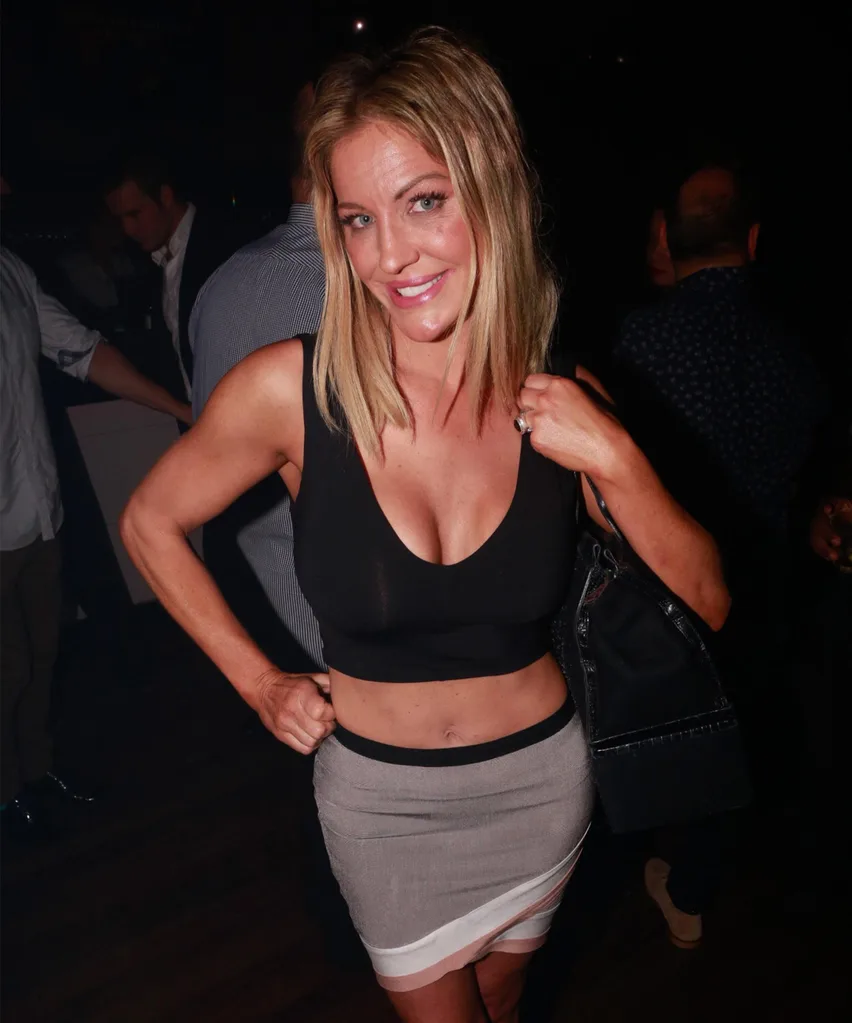
“A nightcap was the last thing on his mind. He was more interested in staying the night,” Brynne tells Woman’s Day.
As for whether she tipped off the paps, the former My Bedazzled Lifestar slams those claims.
“Shane can say what he likes, but there was no set up – none whatsoever. It is a ludicrous proposition. I have paparazzi following me all the time. It’s not something I particularly enjoy, but I understand it comes with the territory,” the blonde beauty insists.
“I do my best to keep my private life private but it can be difficult when you are constantly being followed by paparazzi looking for their next photograph.”
“I warned Shane there was a paparazzi outside the Crown when I left and he responded by saying that it was good that we’d left in separate vehicles. I’m pretty sure the paparazzi didn’t follow me that night, they obviously followed Shane’s taxi from the casino to my address,” she adds.
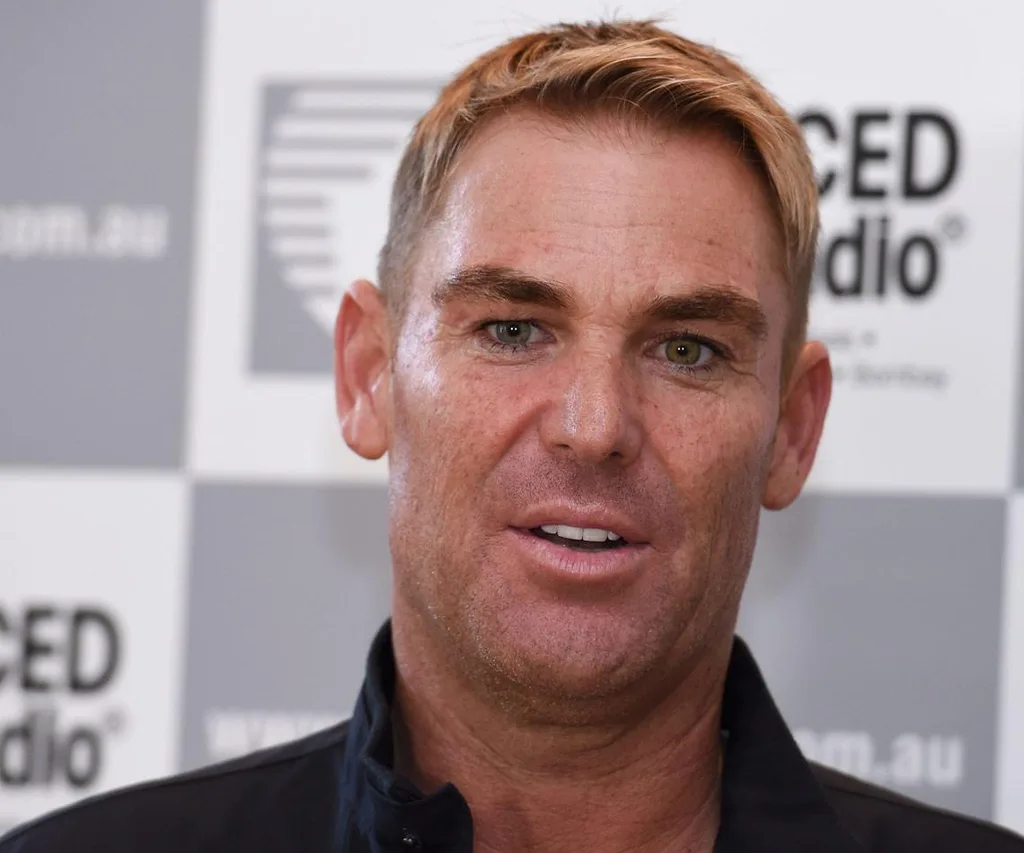
Warnie and the reality star hit it off after attending a charity event together.
Meanwhile Brynne’s ex-husband Geoffrey Edelsten has also weighed in on the matter.
“Shane is a very good friend of mine and I am very surprised to learn that he would be keen on Brynne,” the 73-year-old explains to Woman’s Day.
In fact, the Melbourne-based businessman alleges he’s caught Shane out before, claiming Warnie has hit on his ex, Gabi Grecko.
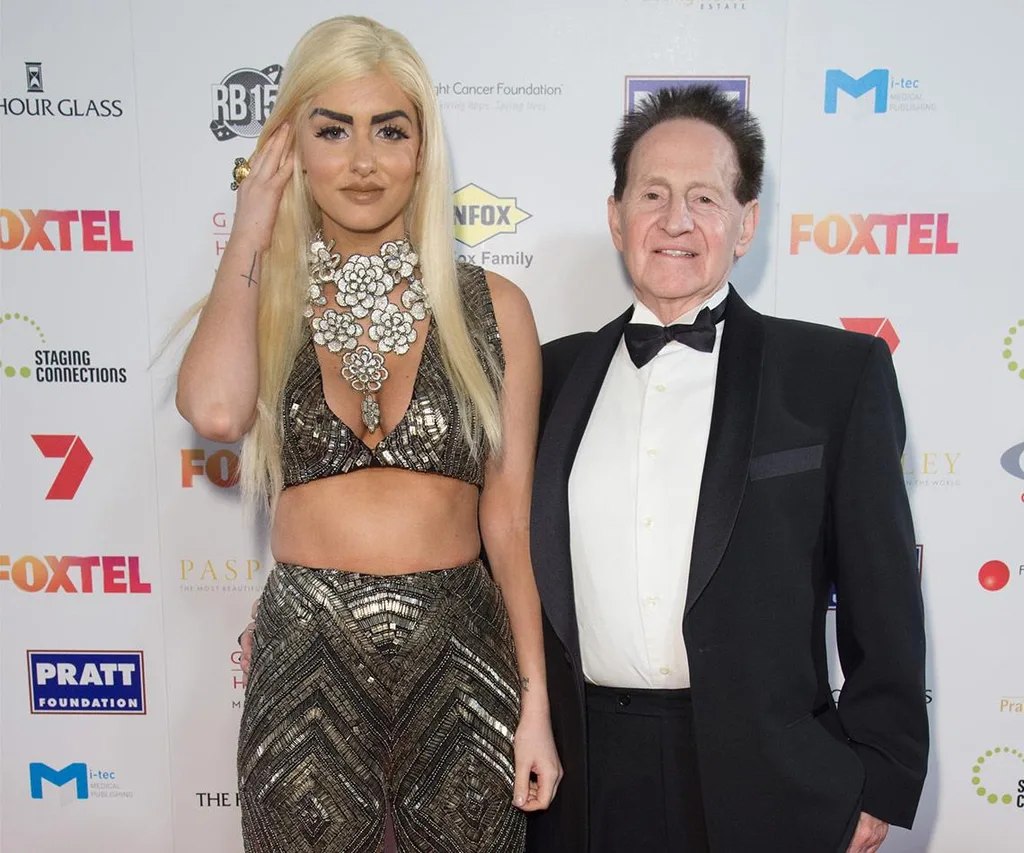
Brynne’s ex-husband Geoffrey Edelsten, pictured with former fiancee Gabi Grecko, has also weighed in on the matter.
“This is not the first time Shane has done something like this. He has sent text messages to Gabi inviting her to his place in the UK. I was very upset and spoke to his manager and made sure nothing happened between them,” Geoffrey tells us.
“I have no animosity towards Brynne and wish her well with whomever she chooses to be with, and if that is Shane then so be it.”
To see more of Shane and Brynne’s heated text exchange and exclusive photos of the pair on the night, be sure to pick up a copy of Woman’s Day, on sale now!
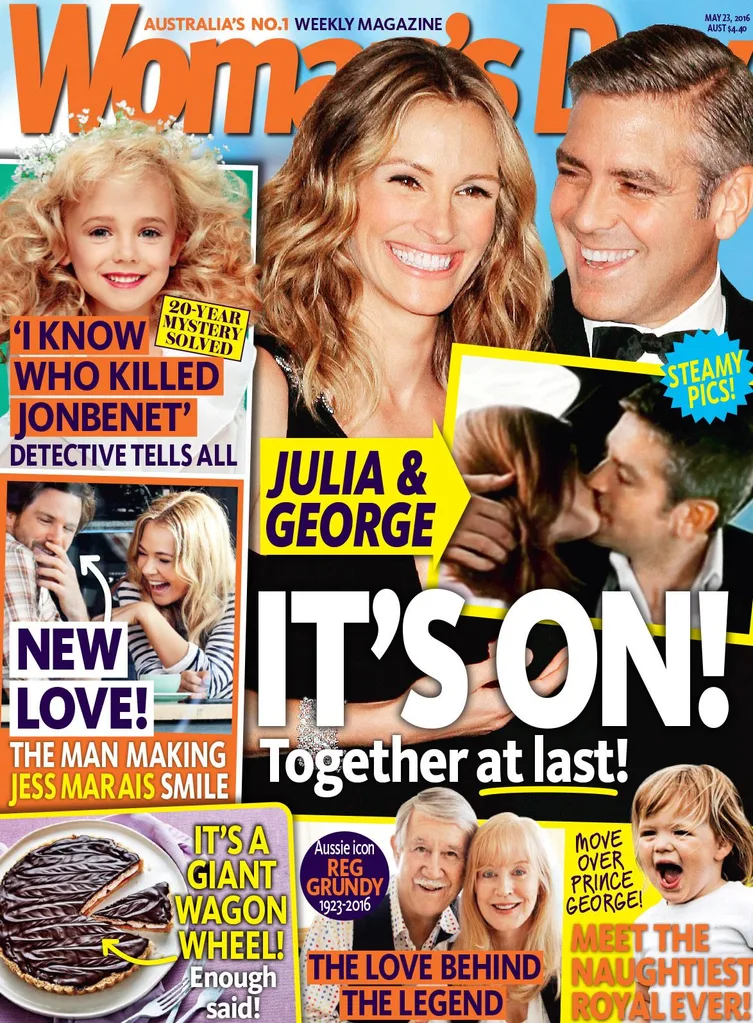














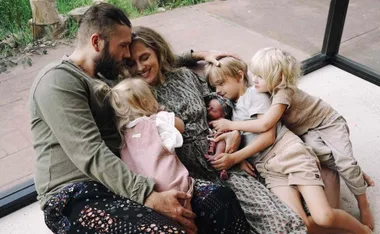
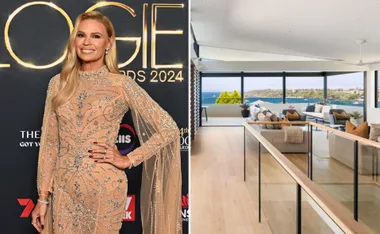




















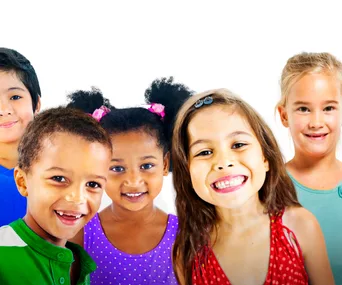
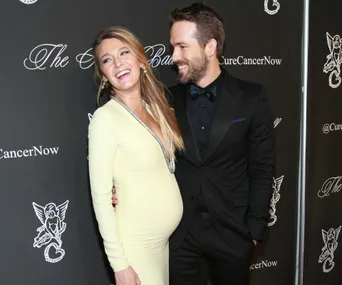










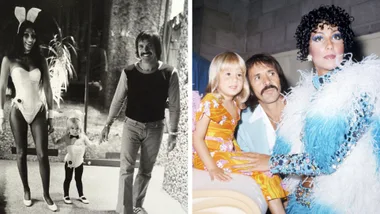


.png?resize=380%2C285)
.jpg?resize=380%2C285)
